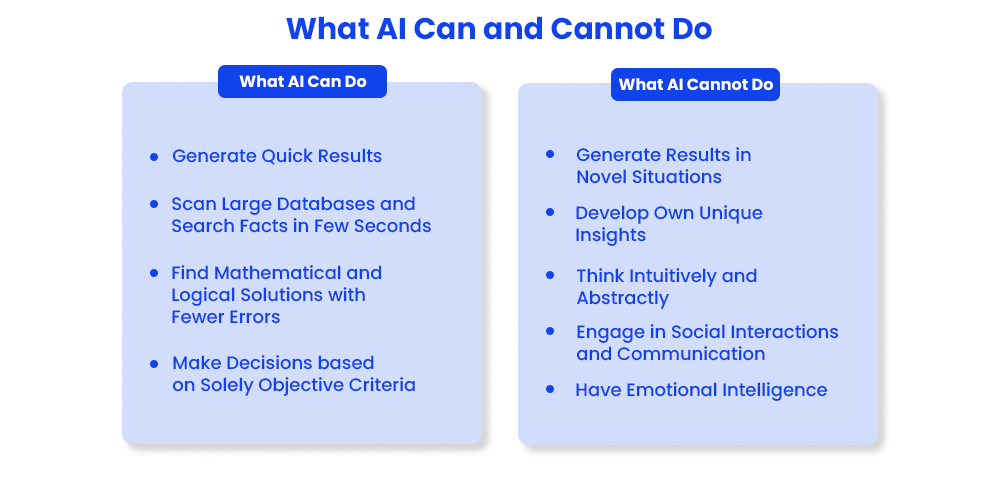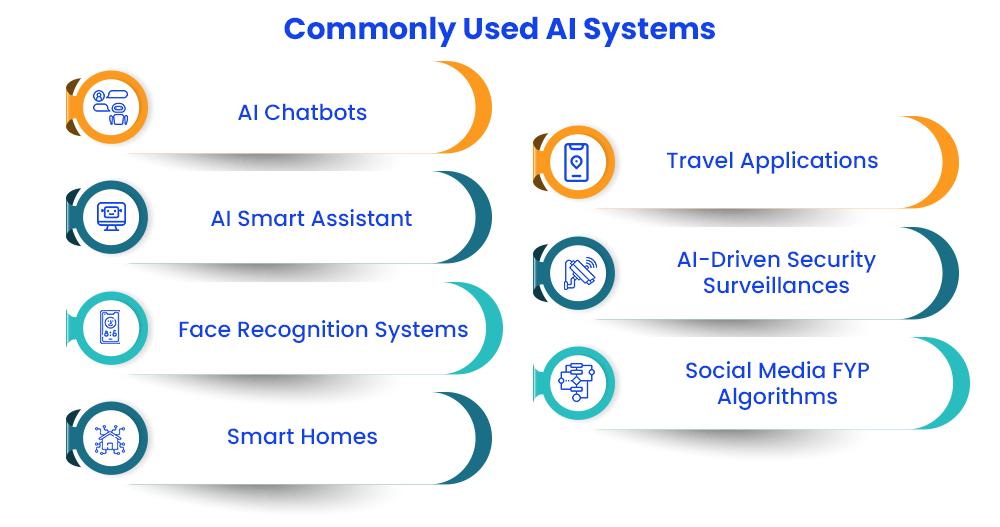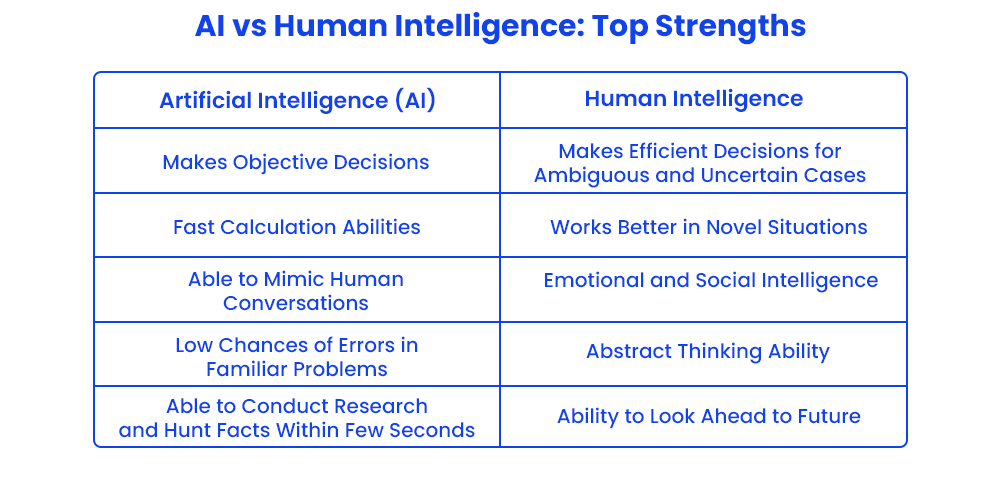Expert Interviews
- University Reviews
- Career Guide
 Video Counseling
Video CounselingImportant Facts
- Ask any Question - CV Forum

Artificial Intelligence vs. Human Intelligence - Explained
College Vidya Team Jan 22, 2026 8K Reads

With Artificial Intelligence impending on almost every other domain of life–be it academics, technological management, planning our calendars to even driving cars for us, the obvious question arises– is there any unique value that human intelligence brings to the table that can sustain the capabilities that AI is rapidly amassing? We ask ourselves, will there come a time when AI will completely replace human intelligence?
Through this blog, we take a dive into the nature and capabilities of AI and compare it to human intelligence, as well as ponder upon the future of AI and human intelligence. Can we as humans excel beyond AI and its growing power? Is there a future of the human mind and intelligence that will not be outpowered by AI?
What is AI (Artificial Intelligence)?
Intelligence has been understood as the ability to understand information, learn from experience, adapt to the environment by correctly using one’s ability to reason. An earlier understanding of intelligence was in terms of the ability of the human mind to act in intelligent ways.
The roots of AI and machine intelligence can be traced to the works of the pioneer Alan Turing in the 1950s, who worked on developing the Turing Test, that he originally called the “Imitation Game” (for testing the ability of a machine to act intelligently which will not let it be distinguished from human intelligence). Since then, the understanding about intelligence is not limited to humans but also to machines.
Artificial Intelligence today, refers to intelligent actions and operations performed by machines. AI, a branch of data science, has been created with the central ability to mimic the human mind and intelligence, and AI developers have tried over the years to develop AI bots and systems that exhibit sophisticated “thinking” and solve problems similar to the strategies used by humans.
AI systems involve a complex network of hardware and software, fed with extensive training data which is read by the system to identify patterns and process the information to predict future actions, find solutions and produce new information. AI systems are generated by using coding systems like Python, Java, C++ etc. 
Some of the common forms of AI systems that are vastly used around us today include:
- AI Chatbots (e.g. ChatGPT)
- AI Art Tools
- Smart Assistance Tools (e.g. Siri, Google Assistant, Alexa etc.)
- Navigation and Travel Applications (e.g. Uber, Ola etc.)
- Face Recognition Systems
- Security Surveillance Systems
- Self Driving Cars
- Smart Homes (Integrated system of AI-driven technologies and electronic home appliances)
- AI-driven Social Media Algorithms and Recommendations etc.

So, AI technologies are much more widespread around us than we realise, and almost in using any technological device/tool, we are indirectly making use of embedded AI-driven softwares. The future of AI is clearer than ever-it is only to grow and expand with a boom in the immediate future ahead of us.
How is Human Intelligence Unique?
Given that the purview of AI is rapidly expanding, one is faced with the question– can AI soon replace the human mind and human intelligence? This is a poignant question, and as I am writing this blog, I can’t help but think of how an AI software would be able to produce a 5000 word essay on this very topic within less than 5 minutes.
What then is it that makes human intelligence different from AI and relevant? It is the fact that human intelligence is not simply a compound system filled with training data about patterns of information. Human intelligence moves much beyond this as it is complex and dynamic– it can not only identify problems, learn from information, situations and experiences, but also actively adapt in novel situations to produce creative and unique solutions.
Additionally, human intelligence also enables people to communicate with each other, i.e. effectively reach out to other humans. Humans are not just intelligent problem-solvers, they have emotional intelligence and social intelligence, aspects still unique to humans and animals, not mimicked by AI yet.
Having abstract thinking abilities, ability to learn from implicit information, develop new solutions in unique situations etc. are the characteristic features of human intelligence that make it unique from the intelligence of machines, which is an attempt at reproducing human intelligence.
In-Demand AI Certicication Course Online
A Comparison: Human Intelligence vs Artificial Intelligence
Here is a comprehensive comparison of AI and human intelligence, with all the strengths and weaknesses of each being highlighted for a face-off.
|
Characteristic |
Artificial Intelligence |
Human Intelligence |
|
Development of Intelligence |
|
|
|
Pace and Speed of Functioning |
|
|
|
Ability to Adapt to Unique Situations |
|
|
|
Learning Ability |
|
|
|
Decision-Making Skills |
|
|
|
Emotional Intelligence |
|
|
|
Social Intelligence |
|
|
|
Abstraction Ability |
|
|
|
Chances of Making Errors |
|
|
|
Flexibility |
|
|
|
Creativity and Innovation |
|
|
|
Versatility |
|
|

The Future: Will AI Outsmart Human Intelligence?
We started with a quote which rightly highlighted that AI can help humans realise the role that they play in adding value to any innovation. After a thorough comparison of the differences between AI and human intelligence, it can be said that human intelligence still beats AI when it comes to certain aspects.
AI is an extremely powerful and impactful creation of technology and surely surpasses some human abilities and functions. However, what helps human intelligence still stand apart and emerge irreplaceable is its very human value that cannot be recreated by machines entirely, even if mimicked in certain aspects. Here we have provided some insights about the possible future of AI and its impacts on human intelligence.
- Artificial Intelligence is far more speedy and faster than human intelligence since it is machine intelligence. As a result, it is quite possible that AI may reduce the need for manual effort and operation on many tasks, especially those with fixed, concrete or specific set approaches to problem-solving.
- AI can change the job roles of humans a lot in the future, with the automation of a large number of job roles, there is an expected shift to job roles requiring more innovation and creativity instead of manual labour and simple calculative efforts.
- Although AI may be better able to approach problems objectively, it is hardly likely to replace human intelligence due to many of its special abilities which cannot be mimicked by machines– the ability to think emotionally, engage in abstract reasoning, use and tweak past experiences to apply them to unique problems, their social intelligence and so on.
- Thus, human intelligence has its own advantages and abilities which cannot be replaced by any software, and there are human qualities in the works of human intelligence which add unique and irreplaceable value to problem solving.
- In the context of decision-making, many studies suggest that AI also engages in complex decision-making by carefully scanning available information, and applying various strategies of decision-making. However, it has been shown that AI lacks the ability to make decisions effectively in ambiguous situations, novel and unique situations, situations needing looking ahead (or looking ahead into the future) as well as cases involving emotionally and socially complex decisions. In this regard, AI is far from outsmarting human intelligence.
- Further, considering the various ethical and legal aspects involved in the creation of AI systems specialising in various areas, it is likely that the utility of AI is to remain limited to certain areas only.
Courses to Explore in AI
Some of the top online courses related to the field of AI can be explored here:
Conclusion
Considering all such factors and the detailed comparison of AI with human intelligence, AI still lacks in some crucial areas of performance, and although it is rapidly improving and becoming more refined, there still remain domains in which human intelligence is much more evolved and irreplaceable. Thus, to conclude, the future is not a face-off or replacement of either by the other, but rather a collaborative integration between artificial intelligence and human intelligence, wherein the strengths and powerful functions of AI get combined with the unique abilities that human intelligence has, to provide the best results across a wide range of areas.
Trending Articles
|
|
|
|
|
|
|
|
|
|
|
|
|
|
|
|
|
|
|
|
|
|
|
|
|
|
|
|
|
|
|
|
|
FAQs (Frequently Asked Questions)
AI is machine intelligence that has been prepared by humans to mimic the pattern of human intelligence and human actions. Artificial Intelligence is prepared by feeding extensive commands and preprogrammed training data in computer software. On the other hand, human intelligence is an inherent capability that the human mind possesses right from birth. Human intelligence can grow through both external experiences and internal mental processes like reasoning, thought, intuition etc. This is not the case with AI, as it does not grow by itself, but needs human intervention to develop and get updated.
The debate about AI replacing human intelligence has risen in the past few years with advancements and mainstreaming of the use of AI systems. However, both scientists and psychologists agree that AI is not likely to completely replace human intelligence since it does not have human abilities of thinking, emotional reasoning, social interaction, thinking ahead into the future etc.
AI is definitely more functional and evolved in certain domains like objective reasoning, researching and fact skimming, in some cases-problem mathematical-logical problem-solving etc. Moreover, one of the biggest strengths of AI over human intelligence is the speed of working and producing outcomes. However, human intelligence continues to function more efficiently in abstract thinking, emotional and social reasoning, working in ambiguous or unique situations etc. which cannot be emulated by AI.
No, AI systems that have been designed uptil now lack any form of emotional intelligence or ability to use an emotional approach to decision-making for arriving at solutions.
AI is more functional than humans in certain cases such as mathematical calculations, logic and reasoning, fact-hunting at a quicker pace etc. Therefore, it is likely that some job domains, especially those involving manual calculations or manual labour will be replaced by AI as it can perform similar functions at a much faster rate and lower costs. However, the rise of AI is likely to increase job domains for humans in unique areas which require complex thinking, reasoning in ambiguous circumstances, effective abstract thinking, strategization and future-oriented planning etc.
AI can beat human intelligence in certain specific areas like quick calculation, scavenging for a range of facts and figures, quick research etc. Human intelligence beats AI in areas like abstract thinking, ambiguous thinking, working with novel situations, emotional and social intelligence etc.
Many professionals are worried about the impact that AI can have on their careers. Although ideally one should strive for integrating the strengths and facilities of AI with their job domain, one can take up the following strategies to stay a step ahead from AI developments– focus on finding unique solutions to problems rather than simply mechanically solving problems, ensure you bring innovation to your work, which makes your human input invaluable, and keep on upgrading your professional skills through skill development.

Idea Alchemist / Concept Creator / Insight Generator
We are an online education platform where users can compare 100+ online universities on 30+ X-factors in just 2 minutes. With an active CV community, we have transformed online learning to quite an extent. With the CV Subsidy scheme, we contributing to GER in India while helping our learners with their finances in their “Chuno Apna Sahi” journey!
Every query is essential.
Our team of experts, or experienced individuals, will answer it within 24 hours.
Recommended for you
Tired of dealing with call centers!
Get a professional advisor for Career!
LIFETIME FREE
Rs.1499(Exclusive offer for today)

Pooja
MBA 7 yrs exp

Sarthak
M.Com 4 yrs exp

Kapil Gupta
MCA 5 yrs exp
or



Career Finder
(Career Suitability Test)
Explore and Find out your Most Suitable Career Path. Get Started with our Career Finder Tool Now!
ROI Calculator
Find out the expected salary, costs, and ROI of your chosen online university with our free calculator.
